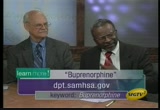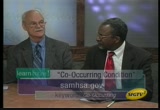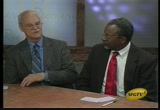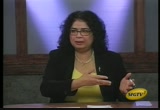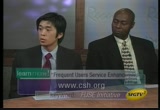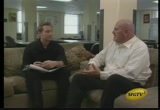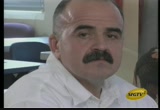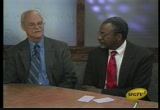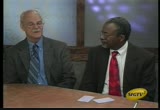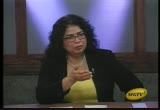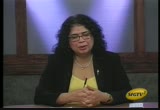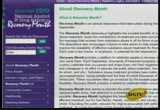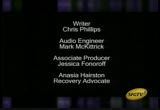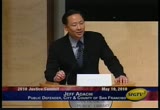tv [untitled] September 6, 2010 10:30am-11:00am PST
11:30 am
and, you know, whatever area you need help in, they're there to help you, with open arms. dr. clark, what are some of the most effective approaches to dealing with individuals that are homeless and that have an addiction problem or a co-occurring condition? i think the most important thing, when you talk about approaches, is that you do have an individualized assessment of the person. you screen for a full range of issues. from samhsa's point of view, that would include mental health issues, trauma, substance use, etc. but remember, we're dealing with somebody who is homeless, so we need to know what else, what other situations are going on. am i homeless because of economics? am i homeless because of domestic violence? am i homeless because of a physical problem that needs to be addressed? am i a veteran who may have access to resources? will i benefit from peer support?
11:31 am
these are all questions the case-, the person doing the assessment should be asking. so then you can move forward. if i'm addicted to opioids, might i benefit from an opioid treatment program, using something like methadone or buprenorphine? these are all things that need to be addressed, and if you, in your assessment, aren't addressing those, then in your treatment plan, you're not accommodating those needs. and so, again, there are many pathways in the treatment approach, but i, i think the hallmark is a very good assessment of where the individual is, what some of the causal factors are, and what the service needs should be. but the whole thrust is to support that person, to move that person into a permanent housing situation, but recognizing that everybody presents with their own unique set of issues, and those issues need to be assessed.
11:32 am
dr. milby, beyond what dr. clark has mentioned, talk to us about some of the more innovative efforts that you're familiar with. well, one of the innovative approaches, i think, is the kind of thing we've been using in birmingham, where people who are homeless-and we're, we're especially focusing on people who have crack cocaine dependence and are homeless and also have nonpsychotic co-occurring disorders. so these people are entered into an intensive treatment program, and they're offered housing that is abstinent-contingent. that's-they're modest apartments. they are provided with a box of food and flatware and cookware, and it's a furnished apartment. handed the key, and then we tell them, tomorrow morning the van'll pick you up and bring you into treatment. make sure you be there, and-but next week you need to start giving us clean urine specimens in order to stay here. so we call that abstinent -contingent housing.
11:33 am
and that's been very effective. so it's dependent on their sobriety, on their staying off of drugs. and participating in treatment actively. and the interesting thing is-and people forget this part, but it's very important-if they are not abstinent, then we transport them to a secure shelter, but the next day the van picks them up at the shelter and brings them back to treatment. and they continue in treatment until they can get back into their furnished apartment. and we keep doing that as long as it takes till they're able to initiate recovery and sustain abstinence and move forward. richard, this denotes a real difficulty in, in getting individuals that have an addiction problem that are homeless into a permanent situation, does it not? talk a little bit about what your approach is in connecticut. right. well, actually we're a national organization, and around the country we work with a number of different nonprofit organizations that provide supportive housing. and, you know, they generally fall within one of two different kinds of service approaches,
11:34 am
one really tailored towards people who are in recovery and that provide the kind of supports-case management, counseling, and referrals to ongoing treatment-for people who are in recovery. but then another category that i think is emerging and growing, which are what we generally refer to as housing-first approaches, that are targeted towards people who are addicted but who-recovery may be a very distant thing in the future, or at least, at least abstinence, anyway. but these are folks who have spent years on the streets or in shelters and who have very severe kind of addiction issues, and where the goal is primarily to, to first take away the immediate traumas of homelessness by placing them into housing, and then wrapping them with the kind of assertive supports that tries to build a relationship and tries to help them feel acclimated to housing as a step towards having them build the kind of cognitive skills that enable them to seek treatment. robert, oxford house does-they do require abstinence, correct, in order for the individual-is it a testing scenario?
11:35 am
ordinarily no. generally speaking, when we, we-individuals apply for membership in oxford house. they generally are coming from a treatment program, or they even may be coming from a shelter. but they've had some, some measured moments of abstinence, where they haven't used. we tend to go through the interview process, and we, we try to gauge, generally speaking, where the person is in regards to their own recovery, because we are peer-to-peer support. we're peer-to-peer support. we don't have professionals online to be able to diagnosis or treat any particular type of situation. it's all about, i'm like you, and we can help each other best. so in that regard, i think that the model itself works very well, very well. because it's all about the desire from the individual. let's talk about the whole criminal justice issue. about 19% of those in federal prisons and 30%
11:36 am
of those in local jails are homeless. what, what is that dynamic about, and what, what are we doing to really help those individuals that have been intercepted? and i'm sure that they probably pick them up if they're having an addiction problem, someone calls up and says, i think somebody has died, or they look like they're dead, and either they end up in the emergency room, and from there they may take them away. is that correct? that's right. and actually, we've been working on this quite a bit over the past couple of years. we have an initiative called the returning home initiative, in which we're working with a number of states and jurisdictions around the country. and the basic idea is that we want to create permanent supportive housing to prevent people who are being discharged from corrections, often who have homeless backgrounds, from having to go to the streets, only to become reincarcerated, either due to rearrest or because of parole or technical violations. and we've had a lot of success. one of the other populations, i think, that's important to look at is people who are
11:37 am
cycling between local jails and homeless services, as well as using many other emergency services that are costly. and these are a small set of individuals who end up using a lot of resources and cost states and local jurisdictions a lot of money. and these what we call frequent users of jails, shelters, and other services are a population that we've been particularly concerned about, and where we've worked with correction agencies around the country to create a model that we call fuse, frequent user service enhancement program. and that is able to help individuals to break their cycle of incarceration, homelessness, and also address their addiction and mental health issues. well, when we come back, i want to continue along the lines of what homelessness is costing this nation. we'll be right back. for more information on national alcohol and drug addiction recovery month, events in your town, and how you can get involved, visit the recovery month web site at recoverymonth.gov.
11:38 am
people trapped by drug or alcohol addiction often feel like there's no hope, no way out. but for every lock, there's a key. and if you have a problem, it's good to know there are real solutions to help you get free. for drug or alcohol treatment referral for you or someone you know, call 1-800-662-help. brought to you by the u.s. department of health and human services. people who suffer from drug or alcohol addiction sometimes say hurtful things. they drive the people who love them most away. if you know someone who suffers from drug or alcohol addiction, listen. try to hear what they are really saying. know that there is hope, and help them find their voice again. for drug or alcohol treatment referral for you or someone you know, call 1-800-662-help. brought to you by the u.s. department of health and human services.
11:39 am
(music) new directions really is the only program specifically designed to serve homeless veterans with co-occurring disorders. we're a long-term treatment program, which really means that we look at every aspect of a veteran's life. we help them change their lives, change their behaviors, and really have the skills that they need to be able to succeed on the outside once they leave new directions. they leave new directions with a job, with an income, with the skills, the life skills that they need to continue out in the society, and friends, and a community, and integrated into the 12-step community. i have become this way through my use of drugs and alcohol. in these walls of new direction, we're safe. you can go through all the emotions and traumas of life and be able to find a remedy or solution or cognitive therapy way to deal with it. a lot of people don't understand about dual diagnosis.
11:40 am
i would not have been allowed to stay in a regular program. my mental illness, my symptoms, included a lot of mania. i was constantly looking for things to do. i couldn't control it. it's gotten to the point now, when the daughters call with disasters and stuff, i can use my third step and leave it to faith that it's going to work out. i came in the door begging for help. i just could not calm down. and it took, it took the three months of them putting up with my behavior, before i even started listening. and then of course we got into the 12-step process, which helps you grow as a person. and between the two processes, learning to deal with mental illness and the 12-step process, i got lucky, and i came out with a chance. it's up to them whether they want to do a type of what we call cognitive exposure therapy
11:41 am
in addressing some of the experiences that they have that have been traumatic. we detail the experience with them, we go over it repeatedly, we talk about some of the emotions that might have gotten stuck within those experiences that they had. and then it's just basically about them letting it out and addressing it and confronting it. i think really what we try to promote here is if you kind of confront the pain, you'll reduce the pain. they have continually and repeatedly medicated and self-medicated their pain through drugs and alcohol. we're teaching them about, where does that come from? let's direct our energy and resources toward the problem. and that problem's often, often rooted in the traumatic incident or experiences that they've had throughout their lives. to see a veteran come in, in the beginning, you know, with a lot of doubt, a lot of-coming from off the street, not having anything, separated from their family for years, and to watch them to begin to transform back into the individual that they once
11:42 am
was before, reuniting back with their family members. we have the saying in here that we give back what was so freely given to us. and that's what the graduates do, you know. they come back and share with the clients. little things, like sittin' down with a guy and going over, what's a realistic budget, or how to buy furniture, or it's ok to go to a garage sale and get dishes. you know, it's the little things that i had to be taught and retaught. and it's a pleasure to see a guy go out and, with $20, and come back with a whole kitchen, or a whole bedroom set, and find out, wow, i can do this. you can live-know, whatever means you have, it's how you live with it. and that's the biggest thing for me, is showing them that i had the opportunity to do it, being shown how to do it, and enjoying living that way. i'm happy. we have this motto of being the last house on
11:43 am
the block, and i really, i truly do believe in that, in that we take the most severe cases of mental illness and substance abuse disorders. so really what our agency focuses on is giving guys, you know, a second chance, a third chance, a fourth chance. it's not easy. so if you're looking for three hots and a cot, it can be provided. but what you will come out of with, if you just open your mind and get an opportunity, is a new way of living, or put you back into the way you were before you got caught in your homelessness or your mental illness or your substance abuse. it actually opens the door for a soldier to stand on his feet again. dr. milby, what are some of the costs to society in terms of homelessness? well, i mean, it provides a homeless person, if we're providing services, we're having the cost of shelter we provide. but some of the other things that probably are
11:44 am
less well recognized is homeless people wind up in the emergency room, lots of times, repeated times a year. that's very expensive for society, because we all, as taxpayers, pay for that. they wind up in jail, and to incarcerate someone is very expensive. so the costs of a homeless person just being allowed to continue in homelessness is very high for society, and some studies have estimated it may be 30-to-40-some thousand dollars a year per person. and some people, if they're repeatedly hospitalized, are costing society tremendous costs, well over $100,000 a year. and, conversely, you know, if we were able to assess, as dr. clark has mentioned, find them some permanent housing, and what other aspects are necessary. employment? well, we haven't talked about that, and i think that is important. i think many homeless people have the potential
11:45 am
to get back into the workforce. in our studies, most of the people, on average, have been employed for five and a half years before they were homeless. so these are people that have the capacity, many of them, to return to the workforce. and i think the programs that do the initial assessment, as dr. clark was saying, and find that they have that history, and they want to get back, they don't have a disability that would interfere, then the service package needs to include employment and vocational assessment, and what are their skills and where have they worked before successfully. and training. and training, providing new training, and in our part of the country we provide transport and take them to interviews. we provide opportunities to practice interviews and how to dress and what to say and so forth. and we help them prepare résumés, even. oxford house-in terms of when a person goes to an oxford house, since it's such a good model,
11:46 am
do they already have a job? does the oxford model provide the jobs for the person, or are you sending them out and saying, you've got to go out and you've got to find a job? basically, when you come to an oxford house, employment is not a mandatory thing. you don't have to have a job. obviously, being that oxford house is self-supported and self-run, they must at some point in time be able to financially maintain their membership. it's a membership situation. what we found is that, a lot of times, especially with the homeless, what we don't have is immediate funds availability to move into an oxford house. that's something which we work with samhsa and other state and local agencies to try to procure funds to allow the homeless, just to subsidize them for a month or so, to give them that, that time to get comfortable, get the support structure, then we have a lot of resources. one of the things which we're doing in oxford house
11:47 am
is we're creating a member resource directory for all of our members. we know what your skill level is, as dr. milby was talking about. we know what the skill level is. what is your chosen field of endeavor, what's your educational background. that gives us a directory when we go to our corporate sponsors, when we deal with the state and local agencies in regards to their resources, to better be able to match up. and you, yourself, you have a construction company now. you're a businessman. would you-how willing are you to take on individuals that are at oxford houses and provide employment? oh, 100% willing, because i know first and foremost that they're, they're trying to better their position. they're trying to better their situation. obviously they've accepted the fact that they have an illness, and they want to do something about it, and they're trying to repair their lives. they're-to me, and especially being an alumni, being an oxford member, there's no one better that you can give an opportunity to. richard, you wanted to add something.
11:48 am
yeah, i think one of the growing areas that i think needs to have more focus is around employment services that are also tailored to supportive housing tenants. and we did a big push several years ago to do what we called vocationalize the home front, essentially have services focused on employment built into supportive housing. and, you know, we had some success with that. i think the biggest challenge was that some of the mainstream systems that are out there that help provide employment supports aren't necessarily tailored to the needs of people who are homeless and who have both addiction and mental health issues. and i think having some of those mainstream systems become more adapted to the needs of that particular population would go a long way to helping people find employment services and find employment. is it possible to prevent homelessness, dr. clark? well, i think that's one of the things that we need to include. the word prevention, preventing homelessness or preventing some of the problems associated with homelessness, by addressing the homeless situation early.
11:49 am
so, clearly, in order to prevent homelessness, you need to know the root cause, you need to be able to deal with the root cause. if the precipitating root cause has to do with substance use, then dealing with substance use would help prevent homelessness. if it is to deal with mental health issues, like depression, anxiety, trauma, then you want to deal with that. or, once a person becomes homeless, it's important to recognize that that person then is more vulnerable to substance use, more vulnerable to some psychological reactions. and part of the intervention, part of the services that richard talked about, is beginning to address some of the psychological issues and the substance use issues so that you don't develop more compound or complex mental health or co-occurring problems; you don't develop a full-blown substance abuse problem because you're self-medicating, trying to cope. so the word prevention, then, goes to the larger
11:50 am
societal issue and then to the programmatic issue. richard? one of the other promising approaches around prevention is also to look at ways to structure housing services that can actually in reach into some of the institutions that discharge people into homelessness. i think there's a big push right now to do prevention in the community through the homeless rapid rehousing programs that hud is, is funding. but, in addition, i think there needs to be more of a focus on both institutions and programs where-that are serving people who then become homeless after discharge, including substance abuse treatment programs, hospitals, jails, and mental health institutions. very good. any thoughts? well, just the partnership that we at oxford house are starting to establish, and have established with the various justice agencies and social agencies, is, is paramount, and especially in, in providing the service of dealing with the homelessness, especially after treatment, because a lot of times people aren't aware, when they come out of, of jail or treatment centers, they aren't aware.
11:51 am
so we find, as you say, we're going into these agencies, doing presentations, making them aware, and at the same time providing them with that opportunity for peer-to-peer support, for housing, to repair their lives. you know, i-we have a homeless ministry in my church that i go to, and i often see even family members trying to do outreach when we have special suppers, and they come in. if i had a person that had a homeless problem, what resources are available for me, or what should i do in that situation, dr. milby? i think the first thing is to, you know, if you discover someone is at risk for becoming homeless or they're initially homeless, to, if you don't know the resources yourself, get them to someone who does know, who can do the initial kind of assessment that dr. clark is talking about, and then get them connected with what they need. robert, final thoughts? the most important thing i can think of right now to think of is the fact that
11:52 am
is that the oxford model, which is a self-supported, self-run recovery home for individuals, it's a marvelous tool. i think that one of the major issues in regards to homelessness is being able to fund, to subsidize, that initial 30 days of being in that type of an environment, to get your foot firmly set on the ground, to be able to go out and take advantage of the social service agencies, the job, employment agencies, and start moving forward. richard? i think i'd want to emphasize that permanent supportive housing is not only cost-effective-we talked about the cost of homelessness, and we know that supportive housing is a lot more cost-effective and a more humane solution. i think the other aspect of supportive housing is that it's also saving lives, that homelessness, and when you add on mental health and substance abuse issues, is, is a leading cause of death in this country, and we need to create permanent supportive housing not only to help people seek treatment and become in recovery, but often just to save their lives. absolutely. dr. milby? i think that those of us who are providing services
11:53 am
and doing research on the homeless situation, i think we find ourselves with a gap in our knowledge. and one of the important gaps, i think, is just how best to provide intervention and services for people with serious mental illness who also are homeless and have a substance use disorder. and one approach is the one we use, the abstinent-contingent housing and intensive behavioral day treatment. another is housing first. and i think we need more research to address that gap, and what are the people that most appropriately respond to housing first? what are the people that need the abstinent-contingent housing? dr. clark? well, obviously homelessness is of major importance to our administrator, pam hyde, and to samhsa. working to provide the critical services that have been mentioned is an important part of that. we, using our grant portfolio, are trying to make sure that in the housing first context,
11:54 am
mental health and substance abuse wraparound services are provided. i've mentioned our soar program that our center of mental health services has, and then dealing with people who are in transitional or shelters because that's where they are, as was pointed out, those are the things that we're doing. and i also like to put in a pitch for our access to recovery program, which allows wraparound services to be provided. it's a state-run program. we are in 19 jurisdictions and 5 tribal organizations, and we allow wraparound services, including facilitated housing and employment services, to be an integral part of that process. so working with our partners at hud, our partners at the department of justice, as well as the administration for children and families, we are trying to make sure that the federal government plays a critical partnership with the ngos in the community. excellent. well, i want to remind our audience that september is
11:55 am
national alcohol and drug addiction recovery month. i want to encourage you to go to the web site, www.recoverymonth.gov, to get more information, and to get engaged, and do an event in september. it's been great having you. great show. for a copy of this program, or other programs in the road to recovery series, call samhsa at 1-800-662-help, or order online at recoverymonth.gov and click multimedia. every september, national alcohol and drug addiction recovery month provides an opportunity for communities like yours to raise awareness of alcohol and drug use disorders and highlight the effectiveness of treatment. in order to help you plan events and activities in commemoration of this year's recovery month observance,
11:56 am
the free recovery month kit offers ideas, materials, and tools for planning, organizing, and realizing an event or outreach campaign that matches your goals and resources. to obtain your copy of this year's recovery month kit and gain access to other free publications and materials related to addiction treatment and recovery issues, visit the recovery month web site at www.recoverymonth.gov, or call 1-800-662-help. it's important that everyone become involved, because addiction is our nation's number one health problem and treatment is out best tool to address it. (music)
11:58 am
>> this morning, everyone, and welcome to the 2010 s justice some of. there must be justice. i want to begin -- to the 2010 justice summit. there must be justice. i want to begin by welcoming you. i am a public defender here in san francisco, and i will be overseeing the first part of the program today. we are going to be talking about something is called ordinary in
11:59 am
justice. if you look if the word, it says, an unjust act, and within the criminal justice system, there are a lot of fun just as if that occur. we just do not hear about them. -- a lot of unjust acts that occur. we have probably all heard there have been 150 human beings who have been exonerated after being sent to death row. that means 150 people in this country were tried and convicted and sentenced to death and then exonerated face on mostly scientific evidence. some served years. some serve a eighth. we hear about those stories. what we do not often hear
66 Views
IN COLLECTIONS
SFGTV2: San Francisco Government Television Television Archive
Television Archive  Television Archive News Search Service
Television Archive News Search Service 
Uploaded by TV Archive on

 Live Music Archive
Live Music Archive Librivox Free Audio
Librivox Free Audio Metropolitan Museum
Metropolitan Museum Cleveland Museum of Art
Cleveland Museum of Art Internet Arcade
Internet Arcade Console Living Room
Console Living Room Books to Borrow
Books to Borrow Open Library
Open Library TV News
TV News Understanding 9/11
Understanding 9/11
